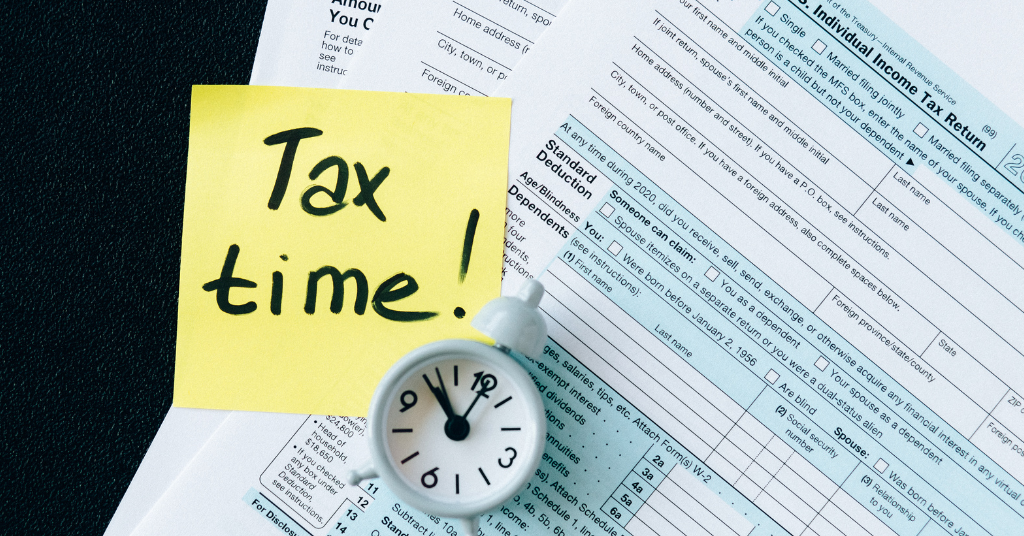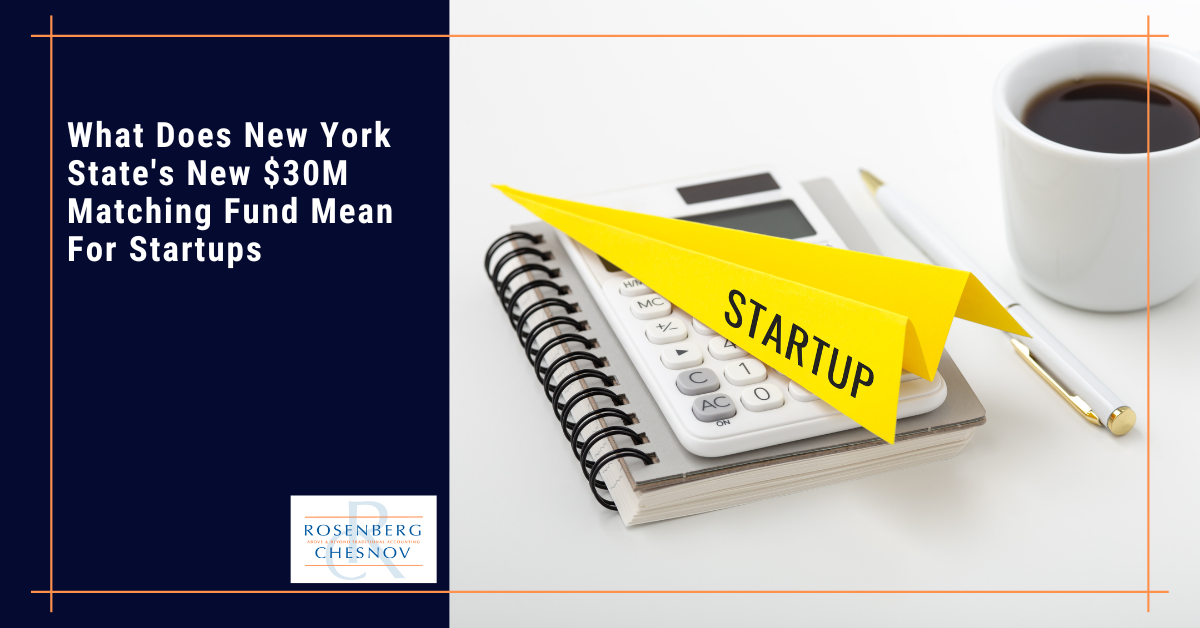

Maximize Your 2024 Refund: Tax Breaks You Might Be Missing
Category: Accounting
Whether you are a startup founder or an investor looking to support the next market-changing idea, securing the funds to grow and innovate is one of the earliest challenges any new company will confront. However, traditional sources of funding, such as venture capital and angel investment, can be challenging to access for many startups.
Without the resources they need to grow and thrive, entrepreneurs with early-stage startups face an uphill battle — which, in turn, impacts the potential benefits an innovative new company may be able to spur, such as job opportunities or a boost to the local economy.
Recently, Governor Kathy Hochul of New York announced a new initiative to provide much-needed financial support to early-stage companies and startups through a $30 million pre-seed and seed matching fund program.
The program will support the development of businesses in high-growth industries, thereby bolstering the creation of 21st-century jobs focusing on traditionally underserved communities.
New York’s new matching fund could represent significant benefits for early-stage companies in the state. Yet, while this is undoubtedly exciting news for the startup community, it’s important to understand how this program works and the tax implications of participating in it.
For a closer look at what Governor Hochul’s $30 million pre-seed and seed-matching program could mean for you, continue reading below.


Before we dive deeper into New York’s new matching program, let’s first ensure we understand pre-seed and seed funding for startups. Both phrases refer to a type of early-stage funding for startups and emerging businesses. However, the meanings of the two phrases do differ slightly.
Both stages are critical, as they provide the resources a new business needs to get off the ground and move toward profitability. However, securing funding at these early stages is not always easy and can be time-consuming — a difficulty New York’s new matching program helps relieve.
Pre-seed funding for startups typically refers to the initial funding that a company receives in its very early stages, often before it has a functional product or service. This funding supports the company’s initial development, including market research, product design, and hiring key personnel.
Pre-seed funding is typically provided by the founders themselves, friends and family, or angel investors. The funding amounts for pre-seed funding are usually smaller than other funding rounds, but they are still critical for startups to get the business off the ground.
One of the main goals of pre-seed funding is to help startups develop a viable product or service and validate the market need for it. With this validation, startups can use the data and insights gathered during the pre-seed funding stage to secure additional funding in later rounds.
The amount of equity that a startup needs to give up in exchange for pre-seed funding can vary widely depending on the funding round’s circumstances, the startup’s stage, and the investors involved. In general, however, pre-seed funding typically involves a relatively small amount of equity; often, the funding comes from angel investors or a founder’s savings, so there may not be any specific equity requirement at all.
Seed funding typically refers to the initial round of financing that a startup receives from outside investors. This funding is used to help the company move from the early development stage to the early growth stage to make the business self-sustainable.
Seed funding can come from various sources, including angel investors, venture capitalists, and crowdfunding campaigns. Generally, seed funding involves more money than pre-seed funding but less than subsequent funding rounds.
When a startup receives seed funding, it provides the necessary resources to transition from the development phase to the growth stage, which can be a critical turning point in the business’s success. It gives a validation point, demonstrating to investors that the company has potential and is worth investing in, as well as growth opportunities such as the ability to hire employees, expand products, or enter new markets.
Investors may also provide support and guidance, including industry connections and mentorship. However, seed funding also results in equity dilution for the founders, as investors acquire a portion of the company.
A matching fund program for startups is a type of funding program in which an organization, typically a government agency or a private foundation, agrees to match funds that a startup raises from private investors.
The matching funds are usually offered on a one-to-one or two-to-one basis, which means that for every dollar a startup raises from private investors, the matching fund program will provide an additional dollar or two dollars in funding, respectively.
The purpose of a matching fund program is to encourage private investment in startups by reducing the risk for investors and providing additional resources for startups to grow and scale their businesses. Matching fund programs are often designed to support specific industries or types of startups, such as those with a social or environmental mission. They may have specific eligibility criteria and application requirements.
Governor Hochul’s announcement of a $30 million pre-seed and seed funding matching program is good news for New York State startups. The matching program is designed to encourage private investment in startups by providing matching funds on a one-to-one basis. This means that for every dollar a startup raises from private investors, the matching program will provide an additional dollar in funding. By doing so, the program is expected to attract more private investment in New York State startups, enabling them to access the resources they need to develop innovative products and services, create jobs, and drive economic growth.
In addition to supporting startups in general, the program is also expected to support startups in underserved communities, including those led by women, people of color, and other underrepresented groups.
According to the Governor’s office, the program will match investments from qualified investors in eligible seed-stage companies on a one-to-one basis, up to a maximum of $250,000 per company. If a company secures $250,000 in investment from a qualified investor, the program will provide an additional $250,000 in matching funds for a total of $500,000 in funding.
However, not all investors are eligible for this program. To be considered a qualified investor, an individual or entity must meet specific criteria, including being an accredited investor as defined by the Securities and Exchange Commission (SEC) and being a resident of New York State, or having a significant business presence in the state.
By setting these criteria, the program aims to ensure that the matching funds go to companies that are likely to succeed and to investors who are committed to supporting the growth of New York State’s startup ecosystem.
The new program comes with significant tax implications for both startups and investors.
From the startup’s perspective, the matching funds received from the program will not be treated as taxable income. This means that the matching funds will not be subject to federal or state income tax, which can help the startups to retain more of the funds raised and reinvest them into their businesses.
On the other hand, investors participating in the program can benefit from tax incentives — the program offers a tax credit for qualified investors who invest in eligible seed-stage companies, equal to 20% of the investment, up to a maximum of $200,000 per investor per year. This means that if an investor invests $1 million in an eligible seed-stage company, they can claim a tax credit of $200,000. The tax credit can be used to offset the investor’s income tax liability in New York State, which can significantly reduce their tax burden.
It’s important to note that the program guidelines have specific criteria that investors must meet to qualify for the tax credit. For example, the investor must hold the investment for a minimum of three years, and the investment must be made in a qualified New York State-based startup. Additionally, the program has a cap on the tax credits available each year, so investors will need to act quickly to take advantage of the program.
To take full advantage of the opportunities offered by the new matching fund program, startups need to consult with an experienced tax accounting firm to ensure compliance with tax laws and regulations. If you’re a New York State startup or investor looking to take advantage of this program, reach out to our team for expert guidance and support.
If you are a client and would like to book a consultation, call us at +1 (212) 382-3939 or contact us here to set up a time.
If you aren’t a client, why not? We can take care of your accounting, bookkeeping, tax, and CFO needs so that you don’t have to worry about any of them. Interested? Contact us here to set up a no-obligation consultation.
Interested in receiving updates in your mailbox? Check out our newsletter, full of information you can use. It comes out once every two weeks, and you can register for it below.


Category: Accounting


Category: Accounting


Category: Accounting
Send us a message and we will contact you as soon as possible.
Jeff Coyle, CPA, Partner of Rosenberg Chesnov, has been with the firm since 2015. He joined the firm after 20 years of business and accounting experience where he learned the value of accurate reporting, using financial information as a basis for good business decisions and the importance of accounting for management.
He is a diligent financial professional, able to manage the details and turn them into relevant business leading information. He has a strong financial background in construction, technology, consulting services and risk management. He also knows what it takes to create organizations having built teams, grown companies and designed processes for financial analysis and reporting.
His business experience includes:
Creating and preparing financial reporting, budgeting and forecasting.
Planning and preparation of GAAP and other basis financial statements.
Providing insight on financial results and providing advice based on those results.
Jeff also has a long history of helping individuals manage their taxes and plan their finances including:
Income tax planning and strategy.
Filing quarterly and annual taxes.
Audit support.
General financial and planning advice.
Prior to joining the firm in 2015, Jeff was in the private sector where he held senior financial and management positions including Controller and Chief Financial Officer. He has experience across industries, including construction, technology and professional services which gives him a deep understanding of business.
Jeff graduated from Montclair State University, he is a CPA and member of the American Institute of Certified Public Accountants, New York State Society of Certified Public Accountants and New Jersey State Society of Public Accountants.
Jody H. Chesnov, CPA, Managing Partner of Rosenberg Chesnov, has been with the firm since 2004. After a career of public accounting and general management, Jody knows the value of good financials. Clarity, decision making, and strategy all start with the facts – Jody has been revealing the facts and turning them into good business results for more than three decades.
He takes a pragmatic approach to accounting, finance and business. His work has supported many companies on their path to growth, including helping them find investors, manage scaling and overcome hurdles. His experience and passion for business reach beyond accounting and he helps businesses focus on what the numbers mean organizationally, operationally and financially.
He has a particular expertise in early-stage growth companies. His strengths lie in cutting through the noise to come up with useful, out of the box, solutions that support clients in building their businesses and realizing their larger visions.
Prior to joining the firm in 2004, Jody was in the private sector where he held senior financial and management positions including General Manager, Chief Financial Officer and Controller. He has experience across industries, which gives him a deep understanding of business.
Jody graduated with a BBA in Accounting from Baruch College, he is a CPA and member of the American Institute of Certified Public Accountants and New York State Society of Certified Public Accountants.
In addition to delivering above and beyond accounting results, Jody is a member of the NYSCPA’s Emerging Tech Entrepreneurial Committee (ETEC), Private Equity and Venture Capital Committee and Family Office Committee.
He is an angel investor through the Westchester Angels, and has served as an advisor for many startup companies and as a mentor through the Founders Institute.